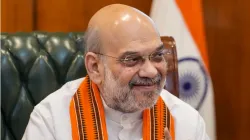Centre extends ceasefire agreement with NSCN faction for another year
The Ministry of Home Affairs (MHA) has announced the extension of the ceasefire agreement with a breakaway faction of the Naga insurgent group National Socialist Council of Nagalim (NSCN) for an additional year. This move aims to maintain peace and stability in the region amid ongoing negotiations.

The Narendra Modi government has extended the ceasefire agreement with the National Socialist Council of Nagaland (NSCN-K) Niki group for another year. The Ministry of Home Affairs (MHA) announced that the renewed pact will be effective from September 8, 2024, to September 7, 2025. The agreement, first signed on September 6, 2021, aims to bolster peace in the region.
“The ceasefire agreement is in operation between the government and the National Socialist Council of Nagaland (K) Niki group, and it was decided to extend the pact for a period of one year with effect from September 8, 2024, to September 7, 2025,” the ministry statement read.
“In fulfilling the vision of Prime Minister Narendra Modi of ‘Insurgency free and prosperous North East’ and in a significant boost to Naga peace process, under the guidance of Union Home Minister Amit Shah, the government of India enters into a ceasefire agreement with National Socialist Council of Nagaland (K) Niki Group," the home ministry had said in a statement then.
Background on NSCN(K) Niki
The NSCN-K Niki group, led by Niki Sumi, is a breakaway faction of the NSCN. Niki Sumi is a wanted figure with a Rs 10 lakh reward issued by the National Investigation Agency (NIA) for his alleged role in the killing of 18 Army soldiers in Manipur in 2015.
Government's peace efforts
The ceasefire extension aligns with Prime Minister Narendra Modi’s vision for an insurgency-free and prosperous Northeast. The government’s peace efforts also include ongoing negotiations with other Naga insurgent groups. A framework agreement was signed with the NSCN-IM on August 3, 2015, under Modi's leadership, aiming for a lasting solution to the conflict.
Historical context
The ceasefire agreements with various Naga insurgent groups, including NSCN-NK, NSCN-R, NSCN K-Khango, and NSCN (K) Niki, follow decades of insurgency in Nagaland, which began shortly after India's independence in 1947. The first major ceasefire was established in 1997 after 80 rounds of negotiations.
Current challenges
Negotiations with NSCN-IM remain stalled over demands for a separate Naga flag and constitution, which the Union government has rejected. Peace talks continue with other splinter groups under ceasefire agreements to promote stability in the region.
Also read | Interpol issues 100 red notices for fugitives in 2023 on India's Request: CBI Director Praveen Sood